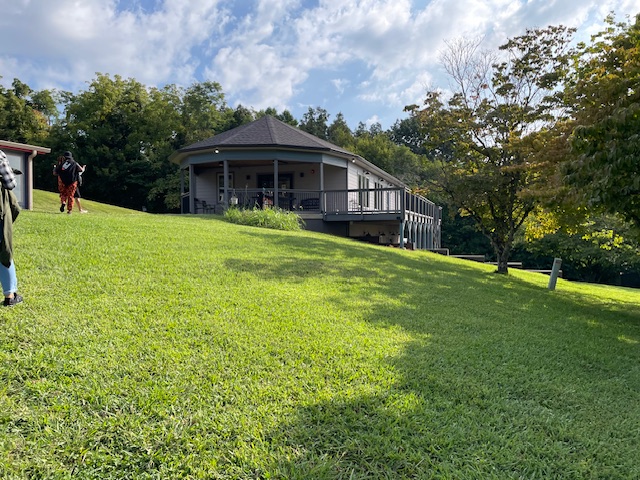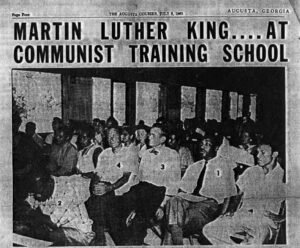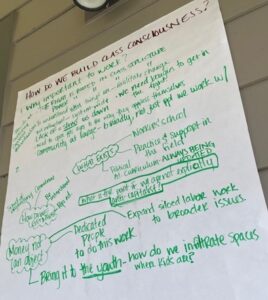Category Archives: Network News/Events
Needs and Dreams
Gabbi Zurlo
I was asked to share my recent experience at Highlander Folk School, but I hesitated for fear of being dismissed as a SC Progressive Network fangirl. Maybe that’s true, but the more I reflect on it, maybe that’s okay. There’s so much to be proud of — and to fight for — in South Carolina.
A few months ago, with no real organizing experience, I left my hospital administration career, graduated from the Modjeska Simkins School for Human Rights, and joined the SC Progressive Network staff. Just weeks into the job, Network Director Brett Bursey suggested I apply for the LIFT fund’s leadership pipeline annual convening at the famed and fabled Highlander Folk School (now known as the Highlander Research and Education Center).
Though brand new, I was accepted. And as other’s excitement for me grew, so did the looming sense that I was depriving more deserving organizers from this opportunity. The Law of Abundance meant that in this I was not only abundant in support and opportunity, but in fear. What if my ineptitude embarrassed the Network? Who was I to be among those hallowed hills in Tennessee, where Martin Luther King Jr, Rosa Parks, John Lewis, and my personal hero, Septima Clark once gathered?
Ideally, once I arrived I would have felt a sense of purpose and belonging. For those three days, however, I struggled to make sense of what I could possibly offer the others. They were leaders of their unions and worker centers across the south, many knowing each other for years. But I stayed determined to harvest whatever I could despite the anxiety.
We spent hours huddled in the small room scribbling the essence of our individual organizations on giant sticky notes for the rest to review and question. The purpose of this convening was to identify our “needs” and “dreams” — of the movement, of our organizations, and of ourselves.
As these seasoned leaders and activists shared their dreams, I sat back in shock. They were dreaming of citizenship schools, inter-generational support, a community space for art and events, analyses on class consciousness and working outside of the capitalist system, for time and space to dream. These dreams were my dreams too — but they are also my reality.
Those three days were educational and inspiring, not because they were teaching me new things, but because I was awakened to the true marvel of South Carolina. In the Modjeska School we were warned that South Carolina is like no other state. For all of the horrors that comes with that, so too comes hope, because the Network is already manifesting what many activist organizations in other states are only daring to dream of.
So, when I think of my needs and dreams as an organizer, I dream of remembering this gratitude. I need the daily phone calls with Brett and Becci Robbins. I need the fear and anger – the thrill of still having so much to learn. I need dancing with Femi at GROW’s Jazz Nights, and I need the 50 years of activism behind me so that I can do my part for the next 50 years.
And if I come across as a fangirl or acolyte, then so be it. We have work to do. The Network allows me to fulfill the needs and to dream my dreams; and whether or not you know it, we’re working for your needs and dreams, too.
Read more about Gabbi Zurlo in an earlier blog post.
Marking the 90th anniversary of the Chiquola Mill tragedy
Honoring those who paid the highest price for workers’ rights
Cecil Cahoon, SC Progressive Network Education Fund Board
One hundred thirty years ago on May 11, 1894, unionized workers of the Chicago-based Pullman Palace Car Company walked off their jobs in protest of 25-percent wage cuts, terrible working conditions, and 16-hour workdays. Company owner George Pullman was their employer and landlord, as most workers lived in company-owned housing, but Pullman kept rents high and refused to hear workers’ grievances. Nor would President Grover Cleveland, who ordered federal troops into Chicago not to keep the peace but to ensure that trains continued to run. When striking workers reacted predictably, Cleveland’s National Guardsmen fired into the crowd, killing at least a dozen and injuring dozens more.
The public sympathized with the striking workers against their abusive and powerful employer, which turned the strike into a political problem. By the end of June, Congress passed and Cleveland signed an act establishing a federal holiday known as Labor Day to honor America’s working class every first Monday in September.
Here in South Carolina, the plantation model of labor management had already been perfected in the textile manufacturing industry, with its class stratification and mill villages evident in every population center of the state. Mill owners built the stores, schools, and churches in their villages, even hired the pastors and teachers and dictated what sermons and lessons would be preached and taught in them. They owned the tracts of rental houses where their employees lived, and they supplied the electricity and gas to those homes. So the meager wages paid to workers came back to the mill owners in rent or payment for groceries, clothing, and everything else.
Every aspect of life was determined, provided, or withheld by a consortium of mill owners according to their preferences, and the result was a permanent under-class of working poor. The model was so woven into the fabric of the state that political leaders trumpeted South Carolina’s “cheap labor” from advertisements in northern periodicals to speeches on the floor of the U.S. Senate.
From Cleveland’s announcement of the first Labor Day holiday through the next forty years, union organizing among South Carolina’s working class was suppressed by all legal means, and by extra-legal means when necessary. Depression-era conditions led workers to strike in protest of the “stretch-out,” a system that increased production while decreasing wages. But no state or federal law existed to protect the rights of workers against employers.
So when workers at Honea Path’s Chiquola Mill joined in the textile workers’ strike that swept from northern Alabama through Georgia and the western Carolinas in the summer of 1934, it was an act of courage. In a mill town as small as Honea Path — population 2,750 — where everyone knew everyone, where Mayor Dan Beacham was also a steward at the local Methodist Church and the mill superintendent, striking workers knew they could be fired with impunity, and that scabs — non-unionized workers who were also their friends and neighbors — could be hired to take their jobs.
What they didn’t expect was to be assassinated by their employer, killed by men they knew personally at the orders of their manager.
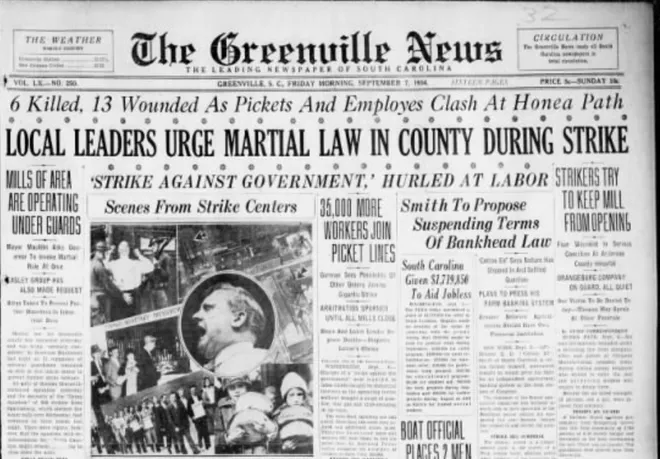
This September 6 marks the ninetieth anniversary of the Honea Path Massacre on Bloody Thursday, when seven Chiquola Mill workers were murdered in broad daylight for the sin of striking for better wages and working conditions.
On that Thursday morning in 1934, as non-unionized workers on the night shift left the property and more arrived to begin the day shift, unionized workers gathered with family members and allies in front of the mill to continue their protest. None was armed; each picketer was searched by union organizers to ensure a peaceful protest. Before 8 a.m., the crowd had grown to more than 300, including some women. Each side shouted questions and comments at the other, with one argument between two men turning briefly into a physical fight.
But earlier that day, Beacham — the mayor and mill superintendent — had deputized and armed 138 men, and had stationed these “special deputies” inside the mill’s second-floor windows. Beacham did this, he said, at the instruction of Governor Ibra C. Blackwood, Sheriff W.A. Clamp, and Adjutant General James C. Dozier.
In the inquest that followed, no one could determine with certainty who fired the first shot from the mill windows, but the shooting continued for several minutes as striking workers turned and fled in all directions. Three of the workers were shot in the back. Clamp and Deputy W.J. Watson were present outside the mill, but Watson later told the media that none of the law enforcement officers present “so much as drew a gun” in the melee.
When the shooting ended, scores of striking workers lay wounded and bleeding in the street, on the sidewalk, or in yards across the street from the mill. Six men were dead: Claude Cannon, 25; Lee Crawford, 26; Ira Davis, 26; E.M. (Bill) Knight, 45; R. Thomas Yarborough, 45; and Maxie Peterson of Greenwood, 25. Two days later, another victim would die of his wounds: Charles L. Rucker, 35.
No weapons were found on any of the slain men.
As the ambulances arrived to take the wounded to the hospital in Anderson, 18 miles away, and Coroner J. Roy McCoy arrived to survey the dead, Chiquola President L.O. Hammett closed the mill for the day. From Columbia came notice that Governor Blackwood had ordered Company D of the 118th Infantry to Honea Path — not to protect citizens or keep the peace, but to protect Chiquola Mill from potential harm.
The funerals couldn’t be held in the churches of Honea Path because they were owned by the mill, W.A. Smith, who was wounded that day, told reporters 60 years later. Instead, open-air services for the first six victims were held on Saturday in a field at the edge of town, with an estimated 10,000 people attending. TIME magazine covered the event. Services for the seventh victim was held on Monday.
L.E. Brookshire, president of the South Carolina Federation of Labor, declared that it was a “cold-blooded attack on unarmed pickets exercising their constitutional rights.”
Chiquola Mill re-opened for normal operations on Tuesday morning.
One week later, a total of 317 witnesses were summoned to testify at the inquest, including 207 named by the state, and more than 90 testified. They included women widowed by the assassinations, the wounded son of a murder victim, and three physicians who attended the scene. Witness Annie May Davis was the wife of victim Ira Davis and the sister to victim Lee Crawford. Witness Jim C. Fox testified quietly and haltingly due to a neck wound.
Through questioning under oath, Solicitor Rufus Fant determined that the shooters included Chief George Page and Officers E.T. Kay and Charles M. “Big Charlie” Smith of the Honea Path Police Department, and “Special Deputies” Robert Calvert, Lev Young, Tom Stalcup, Rob Smith, Lawrence Smith, and Claud Campbell — a 15-year-old boy armed with a .22 rifle.
According to multiple witnesses, Crawford was shot three times in the back from a yard’s distance after Crawford had been knocked to the ground. A physician confirmed that Crawford bore powder burns from being shot at close range, and that Yarborough and Knight were killed by buck shot from a shotgun.
In his testimony, mill superintendent and Mayor Beacham reported that he left the scene before the night shift departed the mill and the shooting began, went home to have breakfast, and only returned to the mill after the shooting had ended.
The hearing lasted two full days. In his summary report to the jury of nine, Fant counted the dozens of witnesses who testified that Officer “Big Charlie” Smith and Calvert shot Crawford; Officer E.T. Kay shot Yarborough; Chief George Page shot E.M. Knight; Claud Campbell shot Cannon; and Officer “Big Charlie” Smith shot Davis. The jury deliberated an hour and sixteen minutes before returning to hold the named shooters responsible for the deaths.
Fant issued warrants charging murder on the parts of Page, Smith, and Kay of the police department, and “Special Deputies” Lawrence Smith, Calvert, Campbell, Stalcup, James Smith, Floyd Smith, and Rob Smith.
In November, a grand jury indicted only Officer Charles M. “Big Charlie” Smith and “Special Deputy” Robert Calvert, finding insufficient evidence to indict the other named shooters.
At trial in the county seat of Anderson the following February, Smith testified under oath that he never took his gun out of its holster during the shooting. Calvert swore he “was not conscious” of having fired his pistol, and that two of the slain men had grabbed and beaten him until he passed out. He assured jurors he regained consciousness only after the shooting was over, and realized after returning home that his pistol had three empty cartridges in it. He denied having shot anyone.
Twenty-two witnesses for the state testified that Smith and Calvert had shot strikers without provocation. Eighteen witnesses for the defense testified that Smith and Calvert had only fired their weapons in self-defense.
Beacham, who told reporters after the shooting that he’d “deputized” 138 men on instructions from the governor, the sheriff, and the adjutant general, conceded under oath that he’d “deputized” the shooters without the approval of Honea Path city council but asserted that the “special deputies” were “sworn in to keep the peace through the town.”
After four hours of deliberation, the jury acquitted both Smith and Calvert.
In the weeks following the massacre, “the town rolled up,” said one resident.
By the end of September, union leaders called off the strike due to “force and hunger,” and when strike funds had run out.
Claude Cannon’s widow, Iona, had six small children and no income, and she lived in a rental house owned by the Chiquola Manufacturing Company. She didn’t earn enough from her job at a local shirt plant to pay the rent, power, and fuel, so the Chiquola owners sent her an eviction notice when the debt reached $115.55. She was given two weeks to vacate the premises.
Then the Chiquola owners offered her a job in the mill where her slain husband had worked, with two caveats: She could work for Chiquola as long as she wished, so long as she paid the back rent and she never mentioned a union. With children to raise and no options, she took the offer.
For decades, Iona Cannon kept the clothes her husband was wearing when he died.
For the next sixty years, no one talked about Bloody Thursday. When documentary filmmakers George Stoney and Judith Helfand began research for a film, Elaine Ellison-Rider of The Belton and Honea Path News-Chronicle published an article on the project and was warned by readers to “let people forget.”
“They were still scared after 60 years,” the reporter wrote. When the strike ended, workers had no alternative to going back to work in the same mill. Children and grandchildren of the murdered men wounded up working at Chiquola Mill if they stayed in Honea Path.
The resulting documentary, “The Uprising of ‘34,” stirred a few descendants to take action and raise funds for a monument to honor the slain men. At an event in May, 1995, Claude Cannon’s daughter and grandchildren saw a granite marker unveiled by Dan Beacham’s grandson, author Frank Beacham. The younger Beacham had been born and raised far from Honea Path and became involved only after learning from the filmmakers of his grandfather’s role.
Chiquola Mill’s new owner, Springs Industries, provided a $440 meat tray for attendees at the public service.
But the documentary also illustrated the immoral lessons that the massacre taught South Carolina’s working class: that workers should be grateful for their employment, should accept the wages and working conditions provided for them, and should expect and ask for nothing more.
Worse, if they attempt to organize through a union to improve the quality of their lives, they should know that their employer could take their livelihoods and their lives with impunity. No justice will be available to them forever. And the state of South Carolina would offer its working citizens no protection from their economic and political superiors.
Those economic and political superiors weighed in one last time to reinforce these immoral lessons when the documentary was released. Decision-makers prevented its broadcast on South Carolina ETV on June 27, 1995, the night that it aired on public television stations nationwide.
SCETV President Henry Cauthen denied that the film was censored for its content. Spokeswoman Kathy Gardner-Jones called it “an editorial decision” and explained that the program department believed “that this film didn’t represent overall community wishes of what they wanted to see.”
SCETV refused to air the documentary for three more years until June, 1998.
One way to honor Labor Day this year is to view “The Uprising of ‘34.” Another is to visit Honea Path and see the marker in Dogwood Park, a short distance from the former site of Chiquola Mill and the murder scene. The abandoned mill began crumbling in 2009 and was demolished in 2018.
Yet another is to seek out and thank the courageous men and women who are dues-paying members of their unions in South Carolina, living and working in defiance of a political and economic system designed to keep working South Carolinians productive, compliant, and unable to threaten the state’s power structure.
Perhaps the best way to honor this Labor Day is to join them in their struggle for better lives.
• • •
Please join us for a virtual program on Friday, Sept. 6. Scan the CQ code in the flyer or click HERE to register. All are welcome.
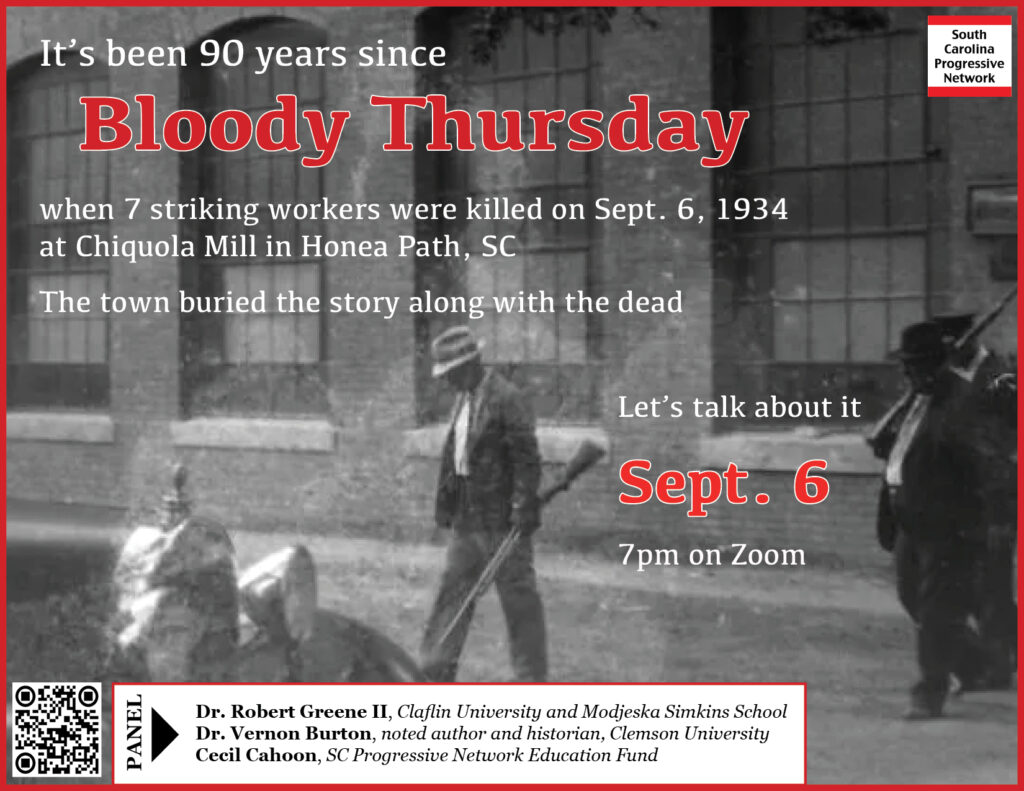
•
The Network’s new hire has a dream: making Ben Tillman roll over in his grave

Gabbi Zurlo has what grass roots organizers call “fire in the belly.” It can’t be taught, bought, or manufactured. And one person with enough of it can change the world — or at least the world around them.
It is that rare quality that moved the SC Progressive Network to welcome Zurlo to our staff not long after she graduated from the latest session of the Modjeska Simkins School in June. She stood out in a class of exceptional students.
Network Executive Director Brett Bursey said, “Gabbi’s serious commitment to social justice was evident throughout the semester. She brings a lot to the table, and we are glad to have her join our staff.”
Zurlo is a South Carolina native, which is important because of our organization’s state-based analysis and focus. She hails from North, the Orangeburg County town whose claim to fame is being the birthplace of Eartha Kitt. North’s population of 671 will lose a digit when Zurlo relocates to Columbia in September with her dog, Dolly.
Zurlo has office and personnel management skills honed in her years working in healthcare at Bon Secours Medical Group and Lexington Medical Center, where she dealt with complex databases and detailed reporting systems. She successfully led a team of 12 at the height of the Covid crisis, demonstrating her ability to adapt and to work under pressure, abilities that will serve our organization well.
Zurlo, 33, brings fresh energy and perspective to the organization. Her enthusiasm already is attracting younger volunteers to our work and to the emerging cultural scene at GROW, the Network’s community space in downtown Columbia. She and classmate Josh Dunn have created a group of the school’s graduates that is meeting every other week to network and share information about the work they are doing. They are manifesting movement building at its best.
Modjeska School Lead Instructor Dr. Robert Greene II said, “Gabbi is one of the most hard-working and compassionate people I have ever met. Having the pleasure of teaching her, I came to see Gabbi as both a committed organizer and a lifelong student — always curious, engaged, and passionate about the work to make the world a better place.”
Network Treasurer Shannon Sylvester said Gabbi radiates joy and an eagerness to work for our mission. “I’ve appreciated the business skills she’s brought to tasks and her willingness to collaborate to solve problems. I’m looking forward to joining forces with her as we move our beloved Progressive Network to the next level.”
For all of Zurlo’s qualities, perhaps the one we admire most is her self-described “inability to tolerate injustice.” We hope her spirit is contagious.
To help welcome her aboard, we are throwing a party at GROW on Aug. 10, 7–9pm. Join us!
Meanwhile, you can watch Zurlo’s comments at the Modjeska Simkins School graduation ceremony in June. It will help you understand the Ben Tillman reference.
Message to Network members and allies
With regret, we must inform you that Brandon Upson, whom we hired on a trial basis in December 2023 as the SC Progressive Network’s Interim Executive Director, is no longer employed by us.
On April 4, 2024, our Board of Directors informed Mr. Upson that he was terminated for violating the terms of his employment. To date, however, on his personal web site he still claims the title of SC Progressive Network Executive Director, ignoring our request to remove that reference.
To clear up any confusion, the Network has no relationship with Mr. Upson, and he is not involved with any of our projects.
If you have questions, please call our office at 803-808-3384 or email network@scpronet.com.
Modjeska Simkins School’s graduates ready to hit the ground running
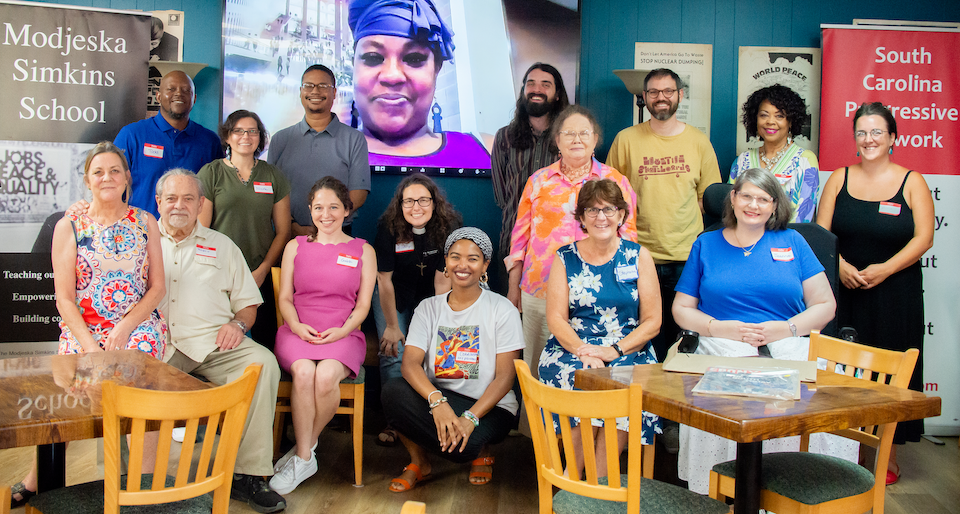
Students in the Modjeska Simkins School’s spring session have been meeting every Monday night and many Sunday afternoons since March 2. The stalwarts who completed the challenging course (not everyone does) celebrated their achievement on Saturday at a commencement ceremony with family, friends, and alumni. This year, 36 students graduated from the school.
It was clear that this session bonded the class, and many of the graduates are already planning their next meetings to talk about projects they want to join or launch.
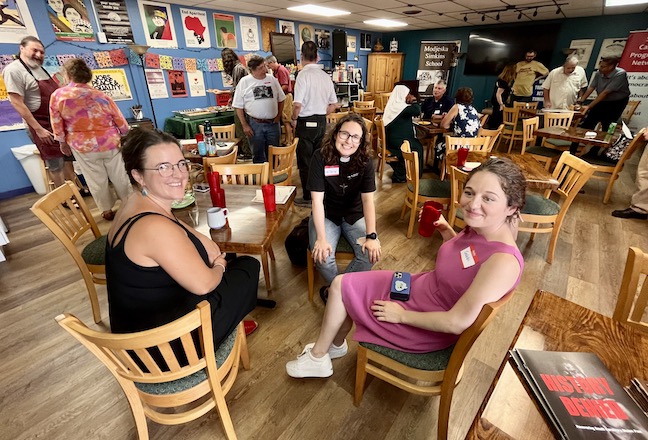
“This year’s class was energetic, enthusiastic, and eager,” said lead instructor Dr. Robert Greene II, who teaches history at Claflin University and joined the Modjeska School staff in 2019. “They reminded me why I enjoy doing our version of a Citizenship School that focuses not only on history, but also on the kind of engaged citizenship that learning the true, unabashed history of South Carolina should foster.”
The school is a project of the SC Progressive Network to teach civics and a people’s history of South Carolina. Network board member and Modjeska School graduate Cecil Cahoon delivered the commencement address. “Our state has been the incubator of inhumane ideas, the place where malignant seeds of public policy are germinated for propagation to other capitals of the South and the rest of the nation,” he said. “This is not hyperbole. Doctor Greene and others have identified scores of examples in your Sunday deep dives and Monday evening classes. In example after example, our state has fought above its weight to train its sister states of the South and to infect the nation with more of its peculiar malices — all the way to and including this present moment.”
The antidote is us, an engaged, educated, community of fellow travelers committed to making “good trouble.”
SC Progressive Network Executive Director Brett Bursey said this session of the school has been especially gratifying. “The students’ testimonials at our graduation indicate that the school is working exactly as we had hoped when we launched the school in 2015. Be sure to listen to Cecil Cahoon’s commencement address. He so clearly articulates the essence of the community we are building to win our individual and collective radical revolution of values.”
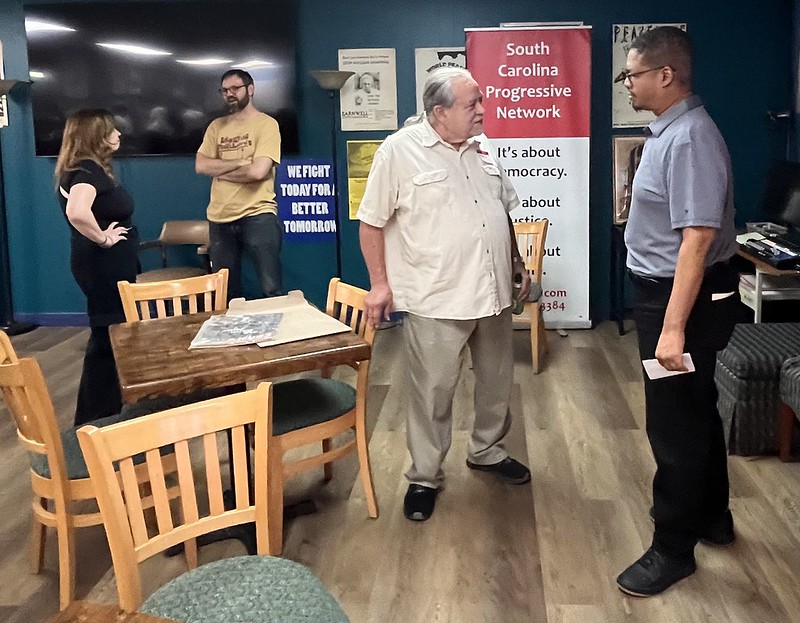
The students who accepted their diplomas on Saturday shared with each other what the last many months has meant to them.
Josh Dunn said, “It’s been transformative. It’s given me a lot of courage and made a lot of my excuses a lot less palatable, and it made me really fired up.Thank you to everyone who made this experience wonderful for me. I remember how I felt the first class when I walked in. I’d only really interacted with these ideas in books. Coming here has been really, truly life-changing. I just feel really grateful to be a part of this bigger community, and I’m really excited to see what kind of change we can make.”
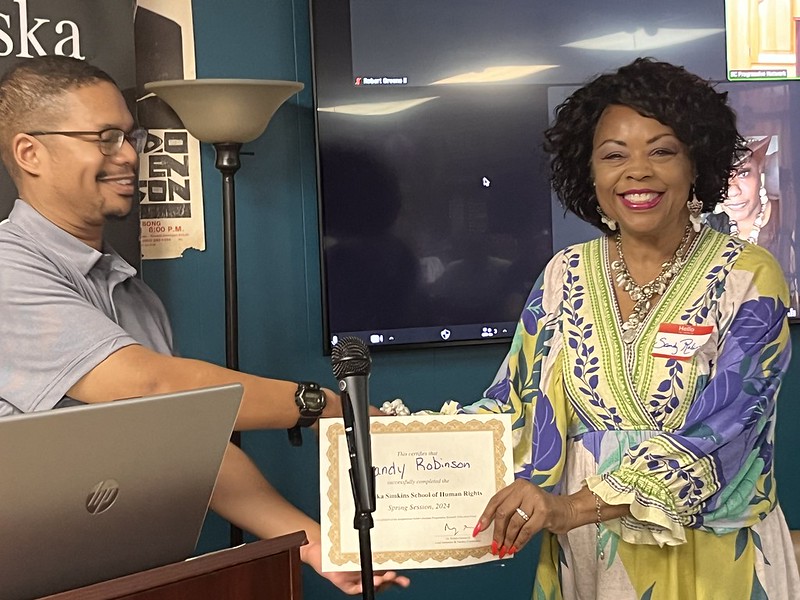
T. Todd Simon said, “I have gotten so much out of this school, but I think the biggest thing I’ve gotten out of this program is the connections that I’ve made. I’m grateful and honored to be among so many people doing such good work here in South Carolina.”
Stephanie Marrone is a former history and civics teacher who moved to Columbia three years ago. She said, “Since we retired here, this is the my favorite thing that I’ve done, coming to this school. I didn’t think I could learn so much at the age of 62. But I did.”
Irene Rigby said that while her husband, Cecil, was taking the course last year on Zoom, she was watching the food network in the next room. She could hear enough of the lectures, though, to be intrigued. She applied for the spring semester and “got a different kind of meal from this school, something that the food channel couldn’t give to me. I ate this meal every Monday, and got nourished in wisdom and justice and righteousness.”
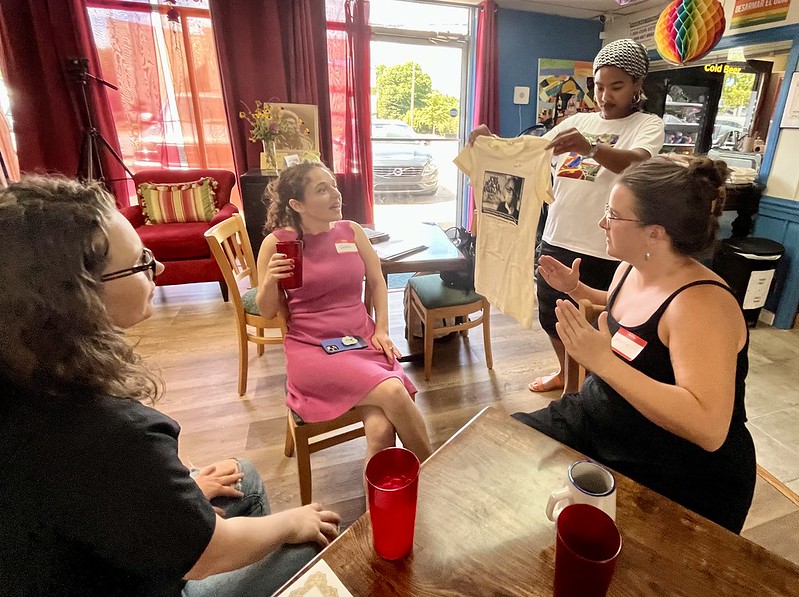
Nichel Dunlap-Thompson said, “Dr. Greene is amazing. I’ve never heard a lecturer able to keep the audience engaged in the manner he did. As Brett has always told us in every communication, it is about justice — racial justice, economic justice — and it is past time for a radical revolution. I stand in solidarity with you all ready to get back into the fight, regardless of what those consequences may look like. As long as we’re fighting on the side of right. As long as we’re fighting for a democracy that represents all people, as long as we’re fighting for climate justice and economic justice that we know all workers — all people — are entitled to, then we already have the victory.”
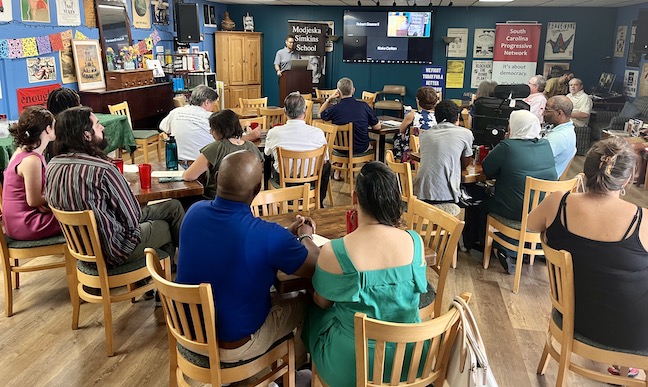
Gabbi Zurlo was skeptical, at first. “I showed up on Mondays, vowing after each class that I was too behind these experienced organizers, too anxious, too rural, too uneducated, too alone, too frustrated, that there was no way I can make any difference. As scary as it was to walk into this room every Monday night, Dr. Green’s tutelage reminded me that this history, these stories, are our stories, and that while Modjeska was right, that this is no sitting down time, there’s always time to listen. Oppression will attempt to divide and conquer. Doubts will slow our steps. We will get tired, and at times will seem to be no way. But we will make a way out no way. We are the swerve toward justice, a better South and a better world. We have all we need to look back and push forward, to be the swerve towards a future that will make Ben Tillman roll over in his grave.”
Dr. Greene said, “I look forward to seeing what our graduates do—for each other, for their fellow citizens, and for the state of South Carolina.”
Congratulations to the class of 2024!
• • •
• Watch the graduation HERE.
• Cecil Cahoon’s commencement address is HERE.
• Our photo album is HERE.
Network mourns loss of co-chair Marjorie Hammock
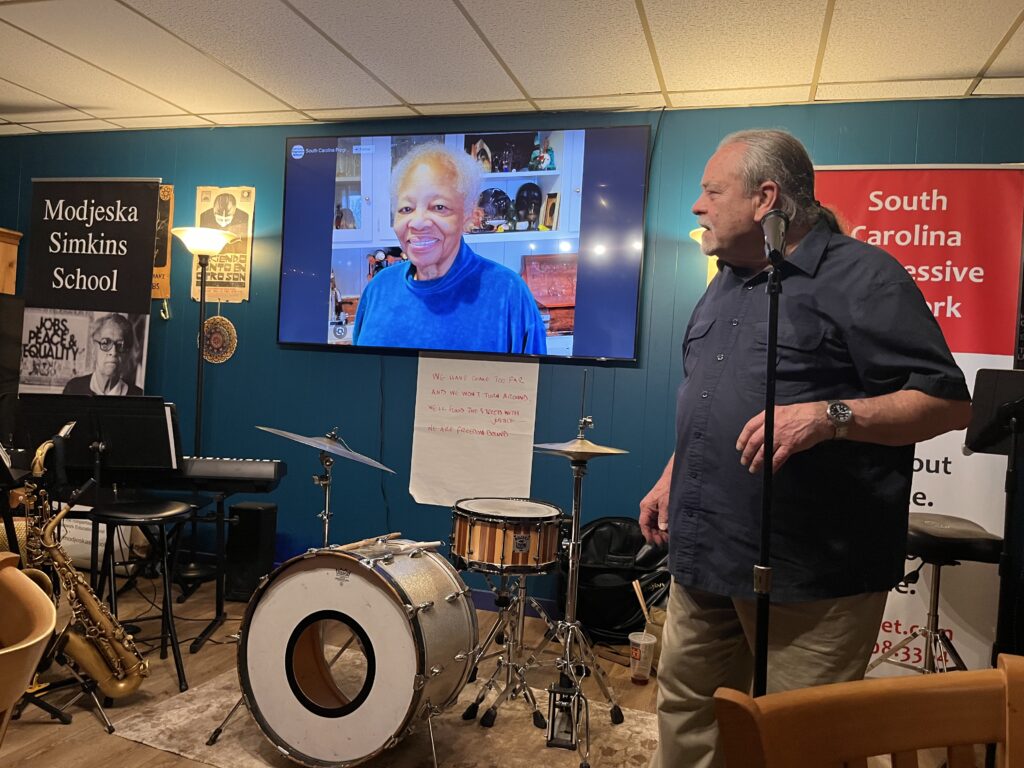
Longtime social worker, community activist, and Network Cochair Marjorie Hammock died on Saturday at age 88. She fell ill on a jazz cruise in the Caribbean last month, but was home in Columbia when she transitioned.
We dedicated our first-Thursday jazz workshop to her, as she loved jazz and was a regular at GROW. Friends filled the room to share stories and toast her memory. It was a bittersweet evening. You can see pictures of the gathering in our Photo Album.
Marjorie was deeply loved for the important work she did and the many lives she touched. She was hired in the late 70s to set up the Department of Corrections’ first social work office, and spent many years counseling inmates and implementing new protocols. Her vast range of experience made her able to comfortably relate to those on any rung of the social ladder.
You can listen to an oral history she recorded in 2019 HERE. It’s a fascinating look at her long life from the time she was born in Atlanta, through her formative years in Connecticut, and her college experiences at Spelman and Howard universities. She also talks about her professional life and her political awakening.
The Network benefitted from Marjorie’s leadership for some 15 years. “She is irreplaceable,” Brett Bursey said. “You can’t buy the kind of respect she commanded among her fellow social workers, South Carolina legislators and academics, and grass roots activists. We were fortunate to work with her as long as we did, and our organization’s roots are deeper and healthier because of her.”
Always an advocate for young people, Marjorie was a huge fan of the Modjeska’s Simpkins School. She attended seven sessions, and enjoyed handing out the diplomas at graduations.
If you’d like to honor her memory by making a donation to the school, you can do so HERE. Your contribution will go toward paying stipends for guest speakers and scholarships for students.
Modjeska School begins 2024 session with largest class yet
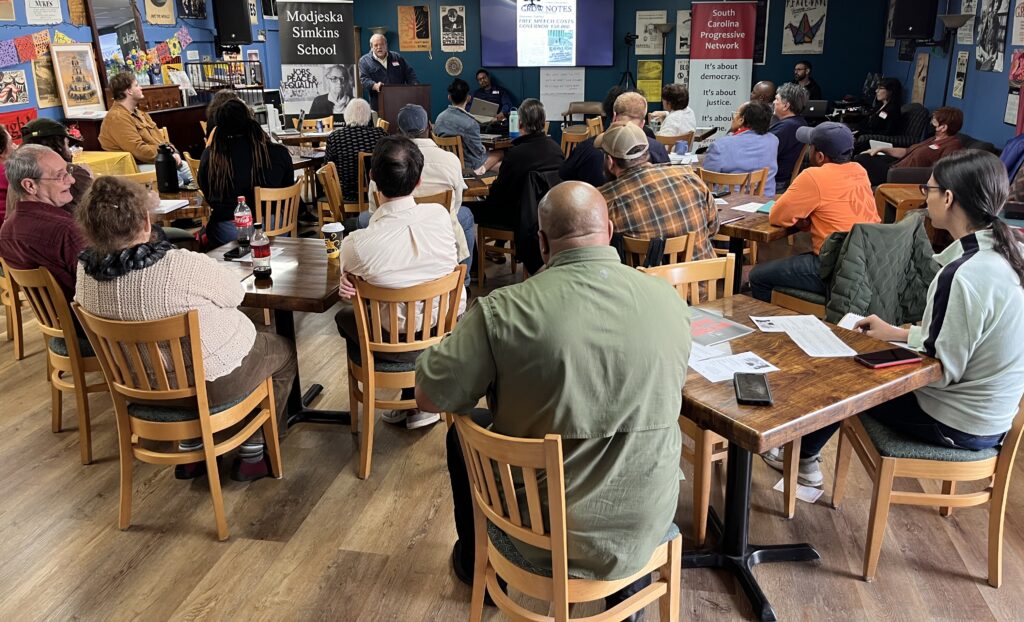
The Modjeska Simkins School kicked off its spring semester with an orientation session on Saturday, March 2, at GROW in Columbia. With 52 new students and 12 graduates auditing (a perk extended to everyone who completes the course), it is the largest class since the school launched in 2015.
Classes will meet on Monday nights through the end of June at 6:30 in-person in Columbia and in Charleston at the ILA Hall, as well as on Zoom. Sunday Deeper Dives are optional for students and open to the public. To receive notices of the public programs, sign up for the SC Progressive Network‘s email list HERE.
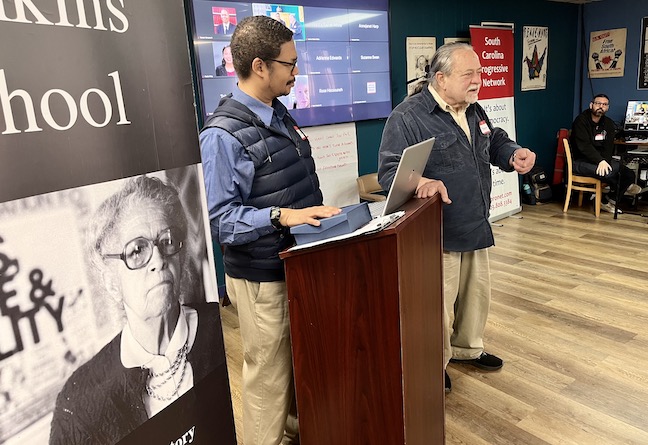
“The incoming class is impressive,” said Brett Bursey, who along with Dr. Robert Greene II will facilitate the spring session. “We look forward to getting to know them over the next few months.”
The youngest student this year is 16. The oldest is pushing 80. That rare inter-generational, inter-racial mingling enriches the diversity of the class and makes for deeper dialogue. Students learn from each other as well as from the instructors and guest presenters.
One student at a time, the school is building community and fueling South Carolina’s movement for social justice. We can’t wait to get started!
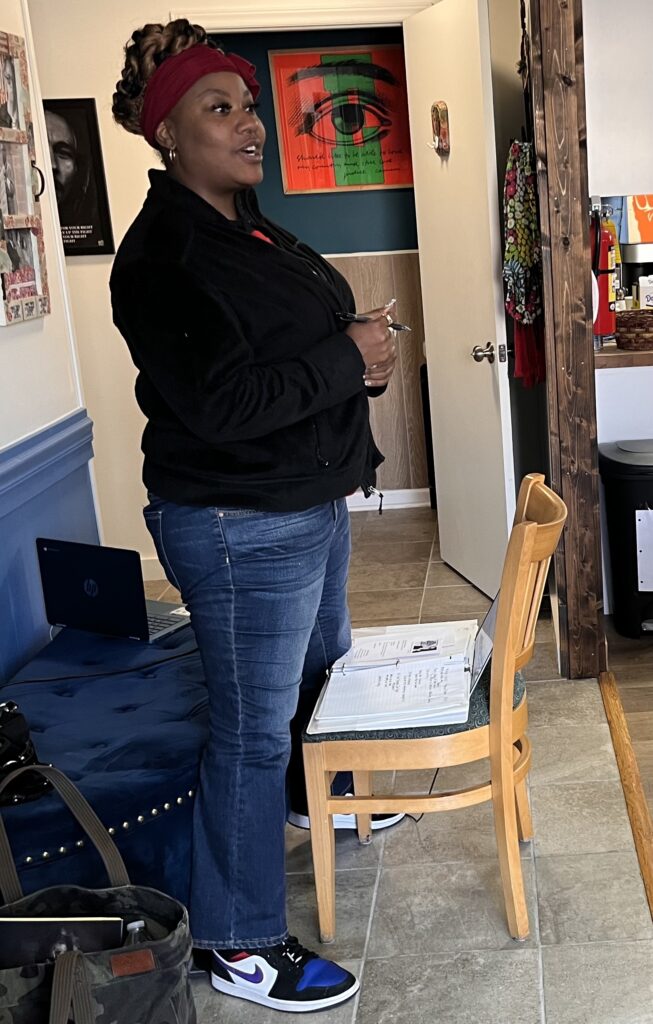
See pictures of the orientation in our photo album.
SC Progressive Network deposits $250,000 in bank committed to social justice
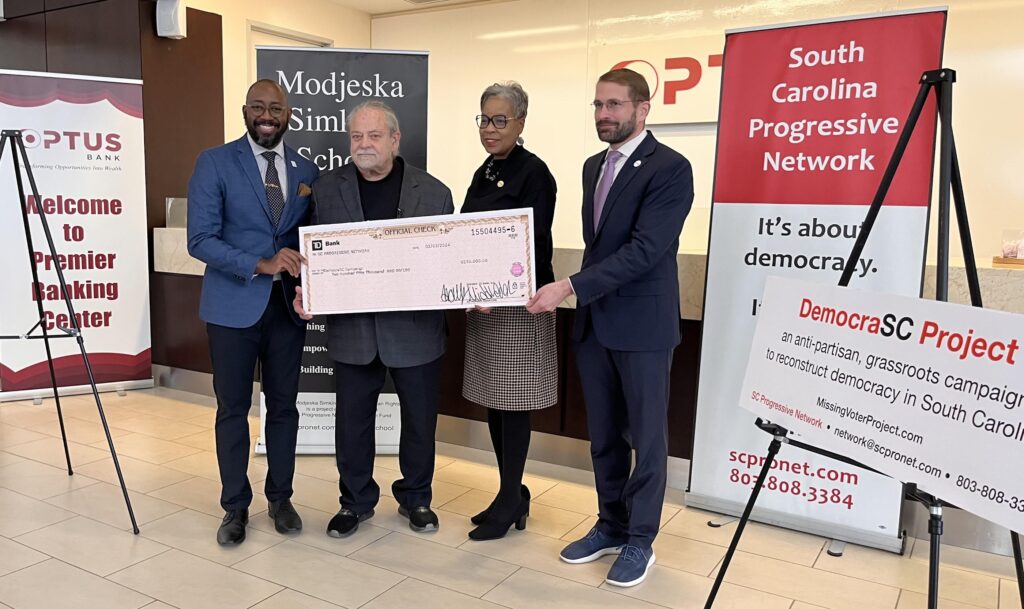
It’s been nearly 50 years since Brett Bursey met Modjeska Monteith Simkins at the Harden St. branch of Victory Savings Bank and opened an account for the Grass Roots Organizing Workshop (GROW). They struck up a friendship and close working relations that endured for the next 18 years of Modjeska’s long life which began in 1899.
Modjeska was 20 years old in 1921 when the Monteith family helped start the bank with $2600 in deposits. Victory Savings, now Optus Bank, was the state’s first Black bank and one of the nation’s few Black banks that made it through the Depression. Victory Savings helped many families, farms, and businesses keep going during the darkest days of Jim Crow.
Modjeska was engaged in the founding of the NAACP State Conference in 1935, which was one of the most active and aggressive in the South. Her outspoken manner, progressive politics, and leadership saw her pushed out of the State Conference in 1957 when her name was intentionally left off the ballot. It was the height of the Red Scare and social justice organizations and activists were deemed communists by politicians who whipped up hysteria to suppress activism.
Modjeska, known for “making a way out of no way,” started the Richland County Citizens Committee and remained active in local, and legislative matters. She participated and spoke at GROW events ranging from anti-apartheid pickets at banks selling South African gold Krugerrands, to anti-nuclear protests at the Bomb Plant in Aiken County,
In 1996, GROW organized the SC Progressive Network to foster a statewide movement of shared values that is gaining momentum in these days of uncompromising nationalism and white supremacy.
In 2014, when our office was in the historic Modjeska house, plans were made to start a school to teach effective citizenship and the Modjeska Monteith Simkins School for Human Rights started classes in 2015. The next year, in the archives at Howard University, we discovered that Modjeska had started a Leadership School in 1946, from the same house, with the same curriculum on good jobs, education, healthcare and racial justice we were teaching 70 years later. South Carolina’s history of resistance has been continually erased, preventing new generations fighting the same problems from gaining ground. The Modjeska Simkins School has started taking applications for the 2024 session, teaching the inspiring history of resistance to the same problems we face today.
Optus, the latest iteration of Victory Savings Bank, manifests the long and closely held tradition of social justice as “mission-centric,” to community banking. The Network moved its main account to one of the big banks when Community Bank, the previous iteration of Victory Savings, went into federal receivership. Brett met with Dominik Mjartan, the president of Optus, and promised to return when the necessary full-service banking operations were attained. Today, SC Progressive Network is depositing $250,000, the majority raised in the last few months from individual donations, to launch a sustained, nonpartisan DemocraSC Campaign to reconstruct democracy. Today’s deposit evidences our appreciation and trust in Optus’ ability to meet our banking needs and their shared commitment to our mission. We encourage like-minded organizations and individuals to join us in transferring accounts to a bank that shares our values.
As we face the most serious challenge to democracy and equality since South Carolina led the nation to war to preserve slavery, we quote Modjeska Simkins, “Ladies and gentlemen, this is no sitting down time.”

